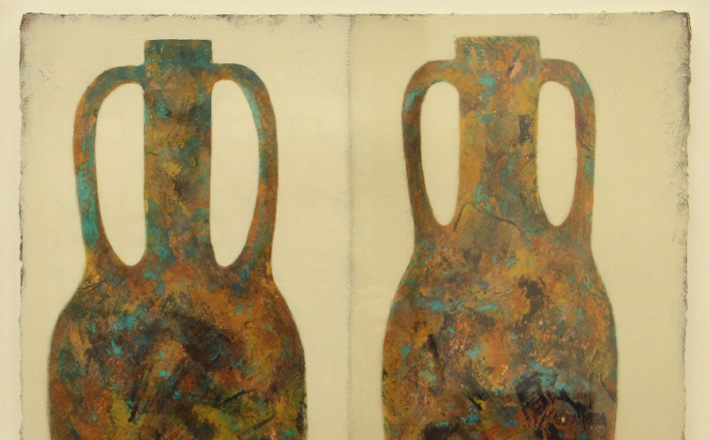Commentary on Philippians 3:4b-14
The season of Lent, with its inexorable movement towards the cross, offers us an opportunity to reflect on our journey through life, from the cradle to grave.
None of us knows just how long that journey will be, or what challenges will await us along the way. A great deal of what we encounter we will not be able to control. What Paul’s words, written from prison, remind us of is the importance of perspective. One of the ways we gain perspective is by engaging in reflection on our past, present, and future, and how they come together in any given moment.
The Past
The phrase “a person with a past” usually conjures up an image of someone who has a past that he would like to leave behind. Yet we all have a past. Whether we view it negatively or positively, our past contains the roots out of which the present grows.
Paul’s past, as presented here, is a boast which he is quickly going to deflate. But that does not mean it should be dismissed. Paul’s ‘boast’ is also an honest claim of who he is. Indeed, his boast would be hollow if the claims he makes were not true. In order to gain a true perspective on our journey through life, we have to be able to engage our past. Honest reflection involves recognizing those things of which we are ashamed, as well as those ways in which we have experienced privilege, or made significant achievements. All of these are present in Paul’s account. He does not shy away from stating that he persecuted the church to which he now belongs; yet he unhesitatingly lists those things in which he recognizes he can justifiably claim pride. The key is perspective.
The Present
Because Paul is engaged in a ‘boast’ in which he compares himself to opponents (either real or possibly ‘straw figures’ erected to strengthen group boundaries), he continues in a hyperbolic voice: whatever Paul has achieved in the past counts for nothing, it is dung. This is not the same thing as saying that Paul had no value as a person in the past. Rather, Paul is putting his life’s journey into perspective.
From the perspective of the present, Paul views his past differently. Paul recognizes that things which he valued in the past, which gave him status, are no longer important to him. Not that Paul has left the past completely behind. He still argues from scripture like a Pharisee (that is, as someone who is skilled in the study and use of scripture), he is still a member of the people Israel; he is still zealous in his behavior. What has changed for Paul is the standard by which he evaluates his life. For Paul, that standard is now his understanding of the life pattern established by Christ.
This standard is expressed more fully earlier in the letter in the so-called ‘Christ Hymn’ of Philippians 2:5-11. It is cited in short-hand here when Paul speaks of sharing in Christ’s sufferings by becoming like him in death. The pattern that Paul is seeking to conform his life to is that of one who does not count privilege as protection or an entitlement, but rather who sets aside all that privilege has entitled him to in order to serve. This theme resounds throughout the letter in phrases such as ‘let each of you look not to your own interest, but the interests of others’ (2:4), and in the examples of Timothy and Epaphroditus. It is expressed also in the language ‘the faith of Christ’ (3:9) which many scholars favor to ‘faith in Christ,’ although perhaps it is a little of both.
Faith is the language of trust, rather than intellectual assent. Paul recognizes that his ‘right standing’ is the result of the faithfulness exercised by Christ on his life journey; because of this faithfulness, Paul is able to trust (have faith) in Christ. It is living into the faithfulness of Christ that enables Paul to view his past differently. For Paul, that means not clinging to the benefits of privilege; for others, who have never experienced privilege, it might mean claiming a heightened sense of self as a result of knowing themselves as persons with and in whom Christ dwells (3:12).
The Future
How we view the future has as much impact on the present as does the past. Despair or loss of hope can make us feel as if we are trapped in a corner with our faces against the wall; in contrast, a sense of hope can give us courage to press on into the unknown. For Paul, the promise of life in Christ through the power of the resurrection not only sustains him in the present, but urges him forward into the future.
Paul is careful to distinguish between the present and the future. Resurrection is his hope; it is not his present reality. Overconfidence in some future promise, whether it is resurrection, a possible job, or a hoped for outcome in a relationship, can deceive us into thinking that the promise is already fulfilled. Believing that we have already attained what is still in the future can lead us to become careless, to not attend to the things that need doing now in order to build a foundation for the future. Paul cautions us to remember that our present moment is destined to become the past that holds the roots out of which the future present will grow.
Paul also does not let this prize give him a false sense of what life is like in the present: that is, the promise does not become a new kind of privilege that protects or entitles. Rather, it is through sharing in the sufferings of Christ that Paul says he will attain resurrection. This is not a call to martyrdom. Rather, it is a call to live into the faithfulness of Christ. How we respond to this call will grow out of our Lenten reflections on the past, present and future–of our individual lives and our life as a community.


March 21, 2010